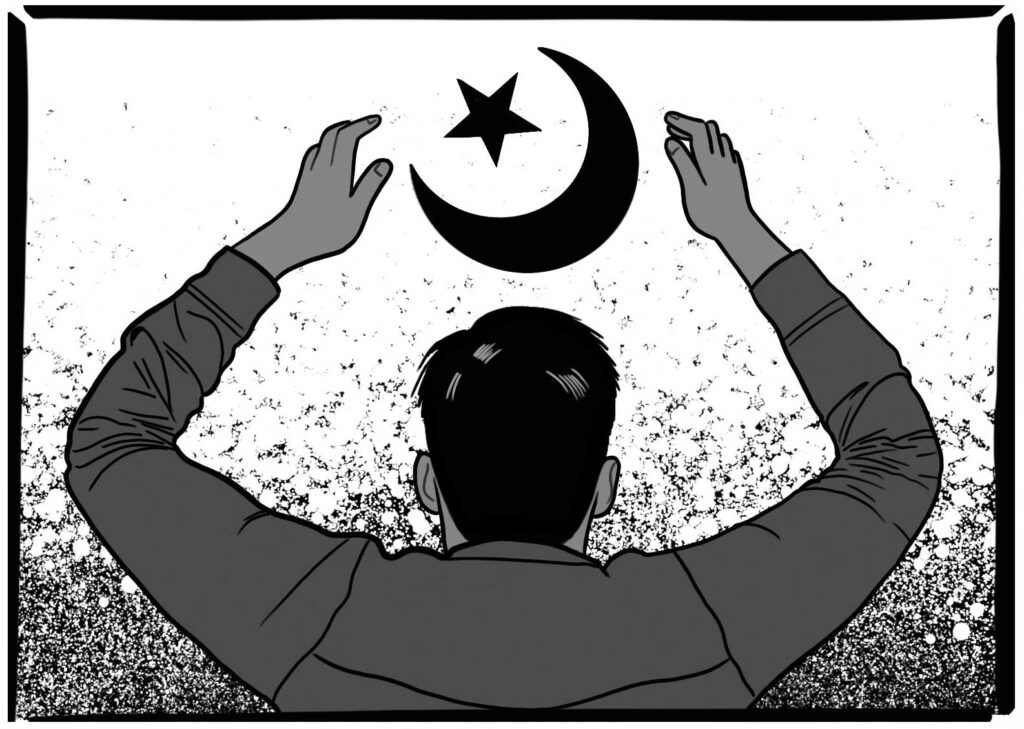Pakistan, one of the most populous countries, is living in the future. The year is 2083, and on August 14, its citizens will observe Independence Day, which once commemorated the 1947 Partition of India. Now it’s a reminder of the civil war that broke out in the 2040s, which divided the urban landscape into New Pakistan —“a walled haven”— and the impoverished Old Pakistan. The latter was then carved into three sectors and an area known as the Badlands, a “squalid” place that most of its inhabitants, at some point in their lives, try to escape. There ashes from nuclear fallout come down in an everlasting grey snow, leaving many ill or dying from “Sky Sickness.”
Saad T. Farooqi’s debut, White World, unfolds in this dystopia. The novel’s narrator, Avaan Maya, is a gunslinging apostate who loses his entire family to violence. Orphaned, abused, and forced to come of age during the war, his only hope in 2083 is to reunite with Doua, his lover who went missing during a deadly raid under martial law three years earlier. To get information about her whereabouts, he begins working for a criminal organization and finds himself acting against his own values and those he shared with Doua, who was engaged in the resistance.

Set in the dystopian future of New and Old Pakistan.
Jamie Bennett
The exploitation Avaan witnesses while on his precarious search speaks to the hazards of a widespread polarization, as well as to the political challenges facing contemporary Pakistan. Chief among them is the treatment of religious minorities. In White World, Sunnis, the Muslim majority in the country today, rule in conspicuous green outfits. The only sect welcomed in New Pakistan, they have access to “more food and water than a person could consume in a lifetime, electricity with no load-shedding, safety and protection, zero crimes, clean air. No snow. A slice of heaven.” Meanwhile, in the sectors of Old Pakistan, Shiite Muslims don blue, while Christians and Hindus dress in red and orange, respectively. The Untouchables wear black and are relegated to the worst living conditions in the Badlands. Some communities are allowed to collect drinking water from the polluted river only at night.
In a memorable scene, Avaan finds a Sunni woman abusing a dark-skinned Christian child for accidentally breaking a water pot. Onlookers at the riverbank watch the altercation in silence. They whisper about the boy with disdain and pity, but none of them intervene: “People stare. They notice that it’s a green-clad person doing all the shouting and look away. Some shake their heads, but no one says a word.”
Farooqi builds an environment where every person plays a role in oppression and segregation, including Jahan, a trans nurse who saves Avaan’s life; Kanz, Avaan’s homophobic partner in crime; and Evergreen, an officer who collaborates with the mob to ensure that the war only worsens. Even rebels have moments where complicity seems inevitable. Farooqi’s invented world alludes to the impact of real historical events: Bangladesh’s War of Independence in 1971, which began with Operation Searchlight, a military campaign that was meant to curb Bengali nationalism in East Pakistan; the 1984 constitutional declaration, Ordinance XX, that deemed Ahmadi Muslims to be non-Muslims; the 2018 Transgender Persons Act; and a controversial bill, proposed in 2021, promising up to two years’ imprisonment for intentionally ridiculing the military.
Avaan meets spiritual leaders who look down on art, engage in various kinds of abuse they claim to condemn, mistreat minorities, and spread hegemonic narratives of inequality. Their stance is most evident in their repressive views on the civil war: “When it came to the snow, the Mullah-sahibs said it wasn’t mentioned in Islamic eschatology. They said it was blasphemy to mention it because our enemies would point to it as evidence that Islam doesn’t have all the answers.” While navigating guilt about his collusion with the mob, Avaan fights to survive in a state that, in his eyes, has been fractured by Pakistanis themselves. As he travels and confronts religious influence in class and culture, he comes to believe deeply in Doua’s revolutionary vision of an unstratified country.
Amid the growing unrest leading up to Independence Day, Avaan finally discovers Doua being held hostage by soldiers in the Badlands. “I’m Majnun meeting Layla after years of separation, his mind still ablaze with the image of the woman she used to be,” he thinks, citing an ancient poem as his now blind lover runs her fingers over his face, trying to identify him. “I’m Orpheus leading Eurydice out of the Underworld, doubt snaking its way at the back of his mind that she’s no longer following.” Once freed, she is disturbed by the brutal activity he was forced to engage in to find her.
White World is a prescient warning of a fractured global society that, with the rise of ideological extremism, may already be on its way. Farooqi suggests that Pakistan’s complex past, present, and potential future may be more interconnected than we’d like to believe. He offers insight into how the rights of various populations have been at risk throughout history and makes a compelling case for why religious freedom is worth protecting now more than ever. Evergreen remembers his father telling him that “Pakistan was a nation chasing many, many ghosts,” a metaphor that extends far beyond what’s come before.* It anticipates a time in which humanity’s worst mistakes may be repeated on larger, more destructive scales.
- -
*The printed version of this review misattributed the memory to Avaan. The magazine regrets the error.
Meral Jamal is an independent journalist originally from the United Arab Emirates and now based in Nunavut.

